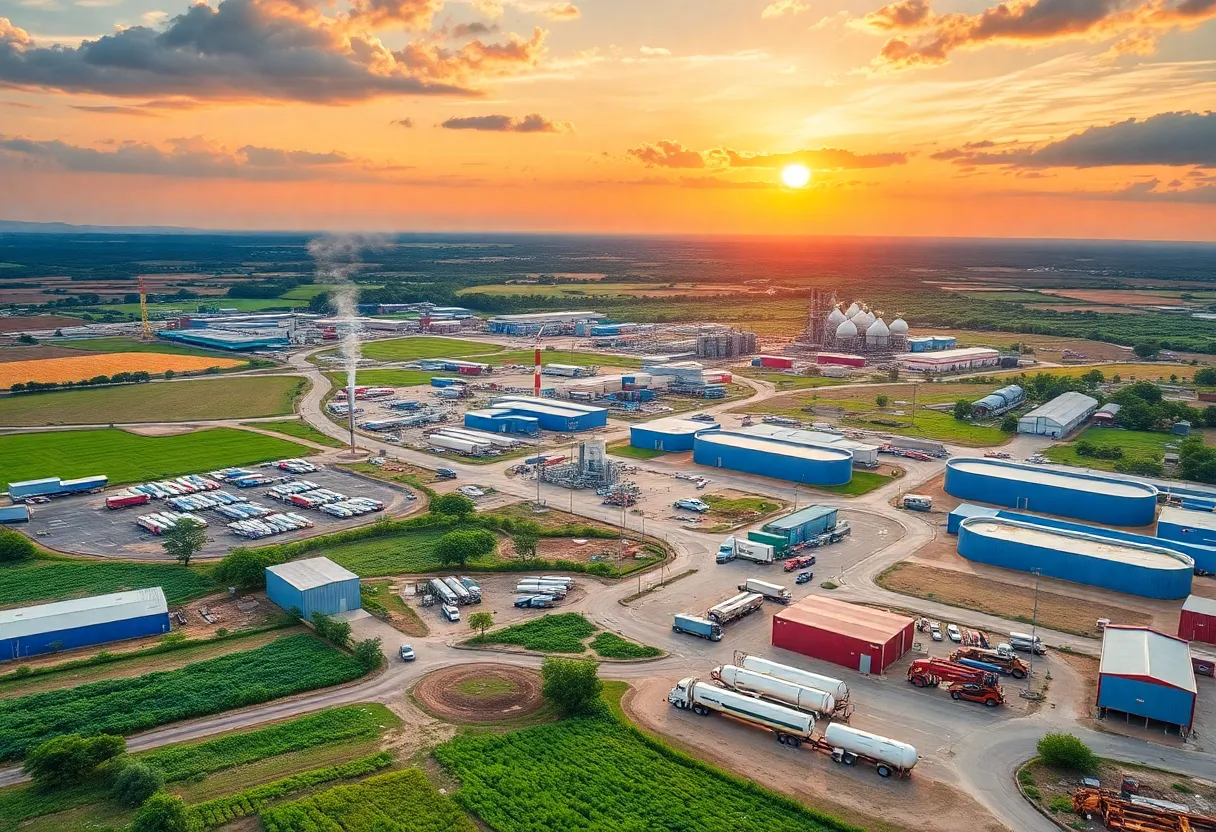News Summary
Trade discussions in Texas are intensifying as the state leads U.S. exports for 22 years straight. With increasing challenges like illegal migration, local leaders aim to strengthen trade relationships with Mexico and Canada. The new Texas Leads Trade coalition seeks to ensure continuous economic growth and stability while addressing potential tariffs that could impact everyday Texans. Despite immediate hurdles, efforts are focused on enhancing workforce training and maintaining healthy trading partnerships for future prosperity.
Austin, Texas: Trade Conversations Heat Up!
As the Texas sun shines brightly, discussions surrounding trade are heating up just as much! Texas, often referred to as the economic powerhouse of the United States, currently holds the title of the 8th largest economy in the world—and it’s on track to claim the 7th spot soon. The energy, manufacturing, and agriculture industries are all thriving, thanks in part to strong trade relationships, particularly with our closest neighbors, Mexico and Canada.
Leading the Way in Exports
For an impressive 22 consecutive years, Texas has proudly worn the crown as the top exporting state in the U.S. Nearly half of all Texas exports make their way to our friends to the south and north, showcasing just how vital these partnerships are for the economy. The U.S.-Mexico-Canada Agreement (USMCA), crafted under former President Trump’s leadership about five years ago, has played a significant role in enhancing these relationships, winning the support of the entire Texas Congressional delegation.
Since the USMCA came into effect, Texas has enjoyed record-breaking trade and job growth. In a bid to ensure these advantages continue, the Texas Association of Business (TAB) is launching the Texas Leads Trade (TLT) coalition. This initiative aims to fortify the North American trade alliance and strengthen the USMCA before its review scheduled for July 2026.
Facing Immediate Challenges
Yet, it’s not all smooth sailing. Alongside trade conversations, there is a strong focus on addressing challenges like illegal migration and drug trafficking. Recently, executives from both the U.S. and Mexican governments agreed to enhance security at the U.S.-Mexico border and have put a hold on any new tariffs for the time being.
In addition, Canadian Prime Minister Justin Trudeau has also joined in, collaborating to improve security and delaying any hikes on tariffs for at least 30 days. This cooperative spirit reflects a mutual understanding of just how important trade relationships are for the overall health of various industries, ranging from auto manufacturing to agriculture and energy production.
Trade Impacts on Everyday Texans
Now, what does this mean for the good folks of Texas? If tariffs do come into play, many fear they could inflate prices for everyday goods—particularly hitting low-income families the hardest, as they tend to spend a larger portion of their income on tradable goods. Last year alone, Texas exported about $35.9 billion in goods and another $4.4 billion in services to Canada, highlighting the significance of maintaining healthy trading relationships.
Regions like the Rio Grande Valley are critical, providing around 70% of the state’s fruits and veggies, positively impacting the local economy by about $25 billion. Still, the lingering uncertainty surrounding potential tariffs has many business leaders feeling jittery. It could lead to postponed investments and stalled expansion plans as companies brace for possible price hikes.
A Call for Preparedness
Economists are weighing in, suggesting any continued tariff threats, even if briefly delayed, could disrupt investment trends and economic stability. Not to mention that proposed tariffs could particularly hit automakers such as Toyota and their suppliers situated in the San Antonio area.
On the broader scale, businesses are being encouraged to gear up for potential price increases on crucial goods like food, lumber, and construction materials. There’s a sense of bipartisan concern that ongoing trade tensions might lead to job losses and hiking prices for Texas consumers, making worry ripple through communities across the state.
Looking Ahead: Strengthening Workforce and Trade
As Texas navigates these complexities, Governor Abbott is emphasizing the need for enhanced career training in schools. Preparing students for jobs in trade is an essential part of fostering a solid workforce for the future. Ultimately, keeping trade free of tariffs with our North American partners is viewed as a crucial element for Texas’s economic vitality and competitive edge in this global marketplace.
With these discussions underway and crucial decisions on the horizon, Texans are encouraged to stay informed and engaged in this ever-important matter. After all, trade isn’t just a policy; it’s part of our everyday lives!
Deeper Dive: News & Info About This Topic
- Texas Border Business
- San Antonio Express-News
- CBS Austin
- Spectrum News
- Dallas Morning News
- Wikipedia: Trade
- Google Search: Texas trade economic impact
- Google Scholar: Texas trade economy
- Encyclopedia Britannica: International trade
- Google News: Texas trade relations






